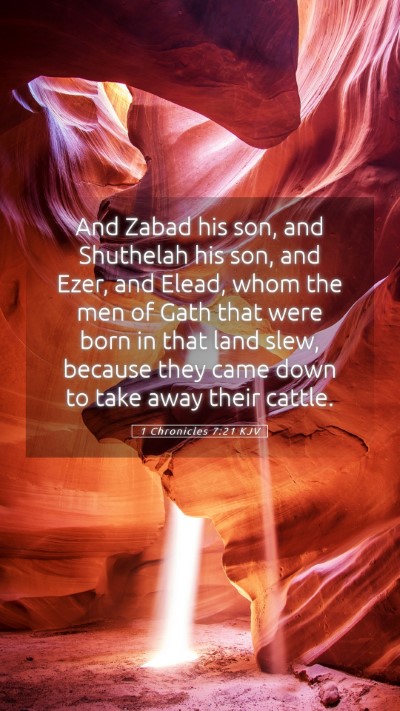Bible Verse Meaning and Interpretation: 1 Chronicles 7:21
Verse: 1 Chronicles 7:21 (KJV) - "And the sons of Benjamin were Bela, and Becher, and Jediah, three."
This verse serves as a genealogical record, essential for understanding the lineage of significant Biblical figures. In 1 Chronicles, genealogies are presented to establish the heritage of Israel, emphasizing the importance of lineage in the nation’s history.
Context and Significance
The mention of the sons of Benjamin is crucial, as it identifies the tribe from which the first king of Israel, Saul, originated. This connection highlights the tribe's prominence in Israel's early monarchy.
Commentary Insights
- Matthew Henry:
Henry emphasizes the importance of the genealogies for recognizing the faithful leaders in Israel's history. He notes that the families recorded through these genealogies were vital for maintaining the historical narrative of God's people.
- Albert Barnes:
Barnes discusses how the detailed records of the tribes serve to demonstrate God's faithfulness in preserving a remnant through which He fulfills His promises. The mention of Benjamin’s sons reflects God's continued provision and grace toward Israel.
- Adam Clarke:
Clarke highlights the significance of the tribe of Benjamin within the narrative of Israel as a whole. He notes that this tribe played a critical role in various Biblical events, underpinning the necessity of recording their lineage for future generations.
Biblical Exegesis
In understanding this passage, it is essential to approach the text with an appreciation of its historical context. The genealogical listings are not merely lists of names but are infused with theological significance, emphasizing God's sovereignty and purpose in Israel's history.
Structure and Themes
The verse contributes to the overall theme of identity and belonging among the Israelites. The Israelites viewed lineage as a marker of identity and evidence of God's covenant with Abraham, Isaac, and Jacob. The three sons of Benjamin represent the continuity of God's promises to His people.
Cross References
- Genesis 49:10 - speaks about the scepter not departing from Judah but indicates the significance of Benjamin's descendants.
- 1 Samuel 9:1-2 - introduces Saul as a Benjamite, underscoring the importance of the tribe in Israel's monarchy.
- Romans 11:1 - Paul asserts that God has not rejected His people, linking back to the tribes including Benjamin.
Practical Applications
Understanding genealogies in the Bible allows for a deeper appreciation of God's plan throughout history. When studying Scripture, one can learn the significance of having a heritage and identity in Christ, similar to how the Israelites connected their lineage to their faith.
Conclusion
In summary, 1 Chronicles 7:21, while seemingly a simple genealogical note, holds deeper meanings about belonging, God's faithfulness, and the historical context of Israel. This verse is integral for those conducting Bible studies and seeking to understand Scripture in its totality.
Bible Study Resources
For further study on biblical genealogies and their significance, consider the following resources:
- Bible study guides focusing on Old Testament genealogies.
- Courses examining the historical context of the tribes of Israel.
- Tools for online Bible study groups specializing in textual analysis.
Keywords: Bible verse meanings, Bible verse interpretations, Bible verse understanding, Bible verse explanations, Bible verse commentary, Scripture analysis, Biblical exegesis, Bible study insights, Meaning of Bible verses, Understanding Scripture.


